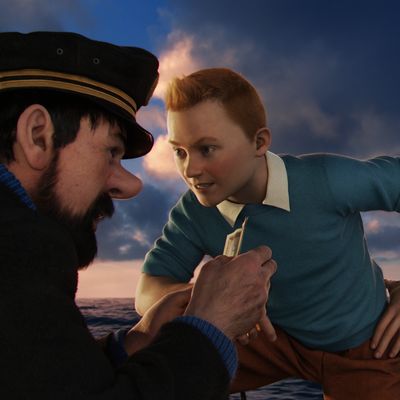
Although Steven Spielberg got crazy rich from all those CGI-heavy Indiana Jones and Jurassic Park roller-coaster movies, IÔÇÖve always preferred his films when thereÔÇÖs a kind of tension between his magically fluid style and the texture of the real world ÔÇö when his camera moves through gritty actual places instead of specially designed never-never lands in which the laws of gravity donÔÇÖt apply. Well, that preference flew right out the window during the first scenes of his 3-D, computer-animated The Adventures of Tintin. Freed from earthly restrictions, Spielberg can be the slapstick-action wizard of his (and our) wildest dreams. Everything he did in live-action movies with rolling boulders and runaway convoys he does bigger and better ÔÇö by a factor of ten ÔÇö in every frame. At the end of two hours, my jaw ached from grinning.
The marvelous credit sequence invokes TintinÔÇÖs original form in the comic strip by Herge (born Georges Prosper Remi, in Brussels), the flat ÔÇ£ligne claireÔÇØ drawings with their bold colors and breathless-slapdash sense of movement, and you might feel a surge of disappointment when it ends and the film shifts to less charmingly old-fashioned multidimensional animation. That disappointment will pass. SpielbergÔÇÖs punchy foregrounds and multiple planes of action (a joke or nutty curlicue on every plane!) will have you goggle-eyed. The camera is in constant motion, so whatÔÇÖs in back will inevitably come to the fore and seize the space, upend your perspective, bombard you with new planes of action, new jokes and curlicues. No one has ever had the means ÔÇö or the talent ÔÇö to use deep focus like this. You can imagine Alfred Hitchcock* ÔÇö who famously praised the young Spielberg as the first director who ÔÇ£doesnÔÇÖt see the proscenium archÔÇØ┬áÔÇö┬á rocking with laughter, belly heaving, coughing out cigar smoke.
What you donÔÇÖt get in Tintin is the kind of offhand political satire that gave the books their puckishness ÔÇö and during World War II, when Herge was working for a pro-Nazi publication, their dash of anti-Semitism. The script, credited to Steven Moffat and Edgar Wright & Joe Cornish, is basically a blueprint for getting the indefatigable reporter Tintin (voiced by Jamie Bell) and his fox terrier Snowy (who has no voice, unlike his comics counterpart) from obstacle course to obstacle course by way of other obstacle course as fast as possible, without really ÔÇ£establishingÔÇØ him or giving him much of an objective besides ÔÇ£getting the story.ÔÇØ The filmÔÇÖs true protagonist and hero is Archibald Haddock, the bulbous-nosed, resolutely alcoholic captain of the merchant vessel Karaboudjan brought to roaring vocal life by Andy Serkis. Haddock and the dastardly Ivan Ivanovich Sakharine (voiced by Daniel Craig) have a centuries-old score, and the captain and Tintin are swept along on the hunt for the last of three model ships containing a cylinder containing a scroll containing clues to a centuries-old pirate treasure.
ÔÇ£Been there, done that,ÔÇØ you say, and as recently as the last shambolic Pirates of the Caribbean picture? Au contraire. YouÔÇÖve never seen flashbacks like this, the present melting into past as the desert-bound Haddock, his alcohol-soaked synapses working furiously, bellows his tale of yore, the great Saharan dunes transforming into giant rolling waves aboard a nineteenth-century pirate ship. YouÔÇÖve never rocketed in 3-D behind a dog chasing a truck containing his kidnapped master, leaping from car to bicycle and into a sea of cattle ÔÇö the camera whizzing past him, pirouetting, and moving backward as each cow lifts its head into the foreground and gives a moo as its udder is tickled, picking up once more on the dog as it leaps off a dock onto a ship. YouÔÇÖve never seen anything┬áÔÇö I mean anything ÔÇö like the chase down the coastal hill town, a single long, zigzagging, tummy-plunging shot in which a falcon, a dog, and sundry heroes and villains steal a set of scrolls from one another while the water from a busted dam cascades alongside them. There are so many variables moving so fast that itÔÇÖs a wonder Spielberg didnÔÇÖt have someone onboard from PrincetonÔÇÖs department of Higher Math to help keep track. But his crack team here is enough. And Spielberg at his best is like Einstein, Rube Goldberg, and Orson Welles rolled into one.
* This post has been changed to correctly attribute the quote to Hitchcock, not to Orson Welles.


